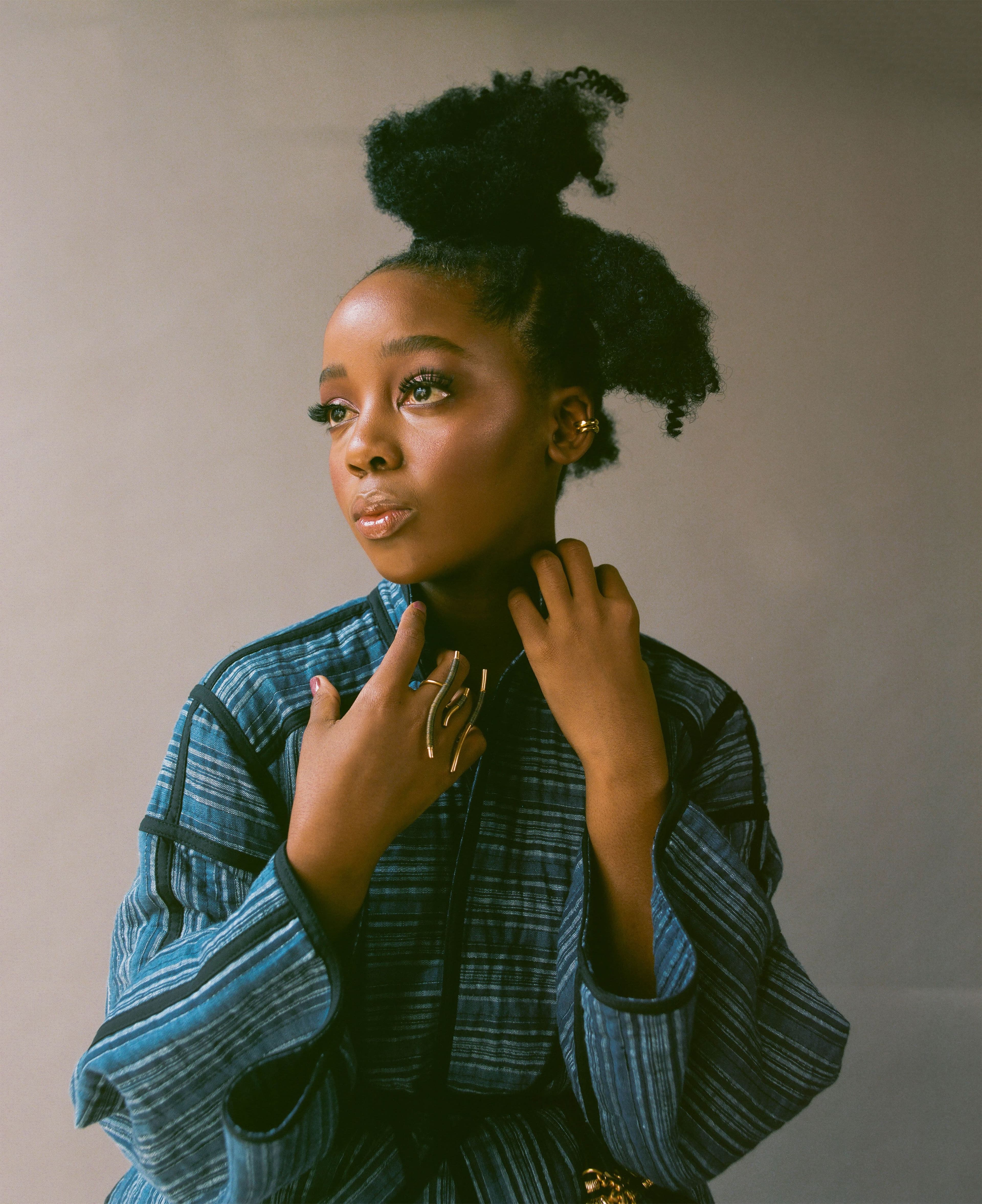
All clothing and belt by Tory Burch. All jewelry by MISHO.
Thuso Mbedu Is the Beating Heart of ’The Underground Railroad’
Last spring, the South African actress Thuso Mbedu had just one day of shooting left on her American début in the television adaptation of Colson Whitehead’s Pulitzer-winning novel The Underground Railroad when production shut down completely due to the coronavirus pandemic. With the future uncertain, she was told the safest option would be to return home, just months after she had sold most of her belongings, including her car, in preparation for what she had expected would be a permanent move to the United States. Living at her sister’s under South Africa’s strict early lockdown and homeschooling her niece, Mbedu found herself struggling to fully grasp the situation. “I’d emotionally and mentally and financially prepared to be in the States for about five years and now I’ve been thrust back to South Africa and I’m just like, ’What is happening!’“ she recalls. “It was a lot to take in. It was emotionally, mentally overwhelming.“
Her whiplash was understandable. As Cora, the escaped slave whose journey across the South is the driving force of The Underground Railroad, Mbedu, now twenty-nine, had been at the center of a major production helmed by Oscar-nominated director Barry Jenkins of Moonlight fame for the last nine months. With support from Amazon and Brad Pitt’s production company Plan B, the series, which just premiered on Amazon Prime, is visually arresting and emotionally wrenching. Over the course of eleven episodes, Cora resolutely endures a winding odyssey of escape from a Georgia plantation, encountering a unique set of horrors in each state she traverses along the way. Inspired by Gulliver’s Travels, the story is an alternate history with an almost allegorical bent, positing an Underground Railroad that is a metaphor made manifest, with locomotives hurtling through tunnels buried deep in the earth, shuttling runaway slaves northward to freedom.
From March until September of last year, when filming resumed, Mbedu says she wrestled with the remnants of Cora that lingered at the edges of her thoughts—understandably so given the emotional depths she plumbed to bring the character to life. “I couldn’t officially say goodbye to Cora because it had been such a process for me to get into that space. I couldn’t officially let her go,“ she recalls. “I was going through ups and downs as Thuso, but I felt some of the residue. You find yourself dealing with thoughts of abandonment and rejection and loss and when you introspect, it’s like, ’Thuso, you’re not in that space right now,’ and you go, ’Oh, that’s Cora.’ Navigating life with that at the back of my mind was a little tricky because I hadn’t officially closed that chapter.“
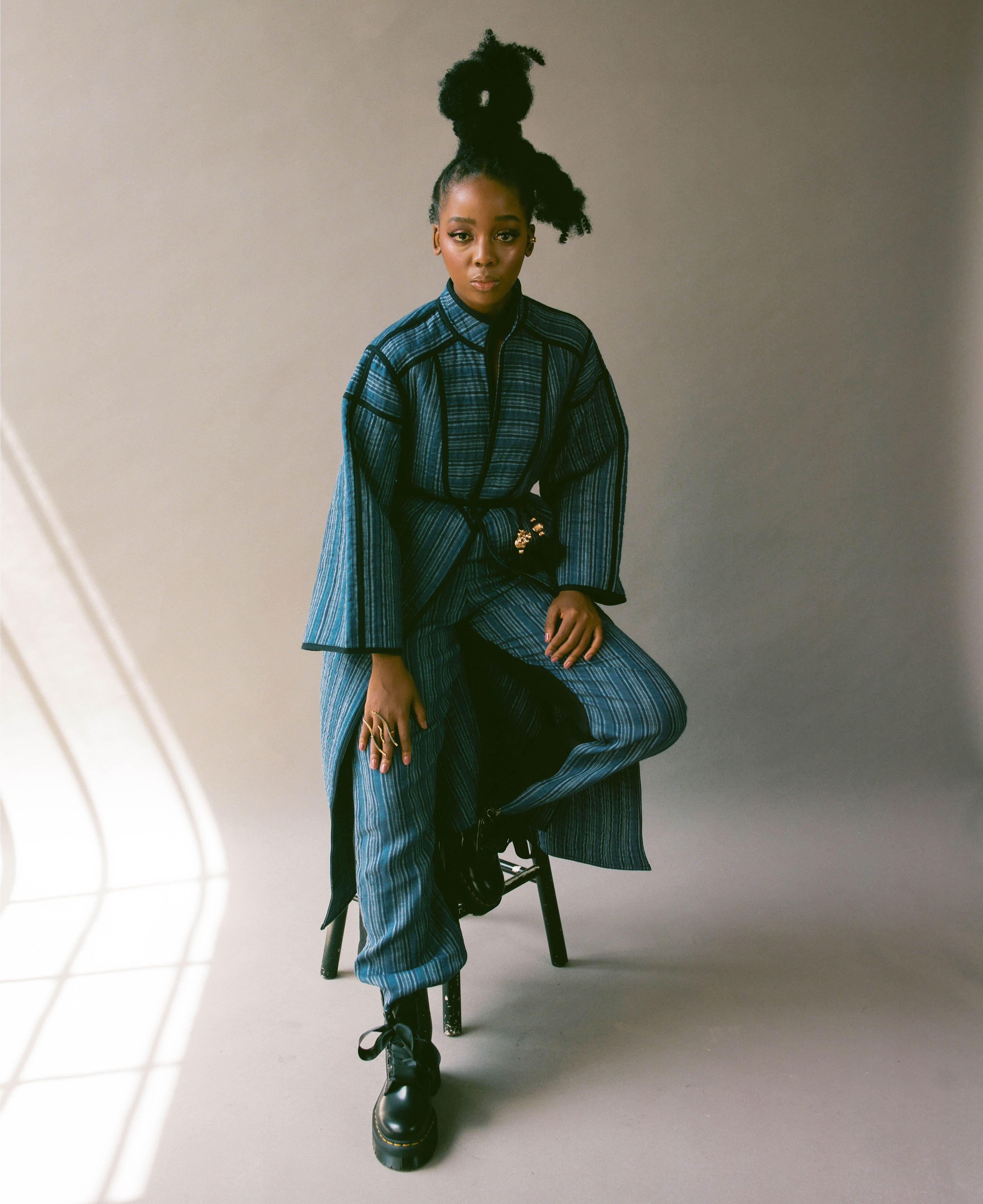
All clothing and belt by Tory Burch. Shoes by Dr. Martens. All jewelry by MISHO.
That intimate connection between Mbedu and Cora began way back in November 2018, when the actress was in New York for the International Emmy Awards, at which she had been nominated for Best Actress for the second year in a row for her role in the South African teen drama Is’Thunzi. Knowing little about the project beyond the four scenes she was sent, she auditioned for Cora then quickly moved on. Months later in Los Angeles, she was asked to perform the same material again. “I went in just to play around,“ she laughs, “because I was like, ’You know what, I can’t do any worse than I did last year, because we didn’t hear from them.’“ It was only afterwards that she learned that she had been at a callback and that Jenkins was directing and wanted to meet with her the next day. “It was a conversation not necessarily about the character, but just about anything and everything. I think he was just trying to gauge who I am as a person and if I’d be able to sustain the role in the long run,“ she recalls. “At the end of it, he said, ’You are the character,’ but he clarified that it didn’t mean that I’d gotten the role—he’d just seen a number of parallels between myself and the character—and then he wished me luck.“ A few weeks later, she was offered the part.
In the months before filming began, Mbedu immersed herself in research to understand the historical context of the story—Jenkins recommended books, museum exhibitions, YouTube videos, and the Slave Narratives, a compilation of interviews with former slaves conducted during the thirties by the Federal Writers’ Project that served as one of Whitehead’s main sources of inspiration while writing his original novel. As a South African who aptly points out that her nation’s democracy is younger than she is, Mbedu says she is intimately familiar with the broad, oppressive reach of systemic racism, even if the details differ country by country. Speaking on the day the former police officer Derek Chauvin was found guilty of murdering George Floyd, she notes that her preparatory work was “not just focusing on the 1800s per se, but actually reading and taking in the history of African-Americans up to the present day. What we realized in reading the book is that, as much as it’s a historical fiction, the themes explored are still very relevant to today. The emotions that people are feeling today are not far removed from what we’re exploring in the story.“
Floyd’s death, which occurred during the production’s long hiatus last summer, was yet another reminder of how little has changed in the two decades since Whitehead first started conceiving Underground. With the resurgence of the Black Lives Matter movement and a nationwide reckoning over racism and inequality over the past twelve months, Mbedu notes that the issues found in the story continue, sadly, to resonate today. “You would hope that by the time the show comes out, it’s irrelevant because things have been dealt with, but 2020 would show you how very, very, very relevant it still is,“ she says. “Back in the day, they had the patrollers, which have been replaced by policemen. Back in the day, patrollers could stop you and ask you anything, and if they felt like it, they could kill you. We saw a lot of that in 2020 and it’s happening still in 2021.“
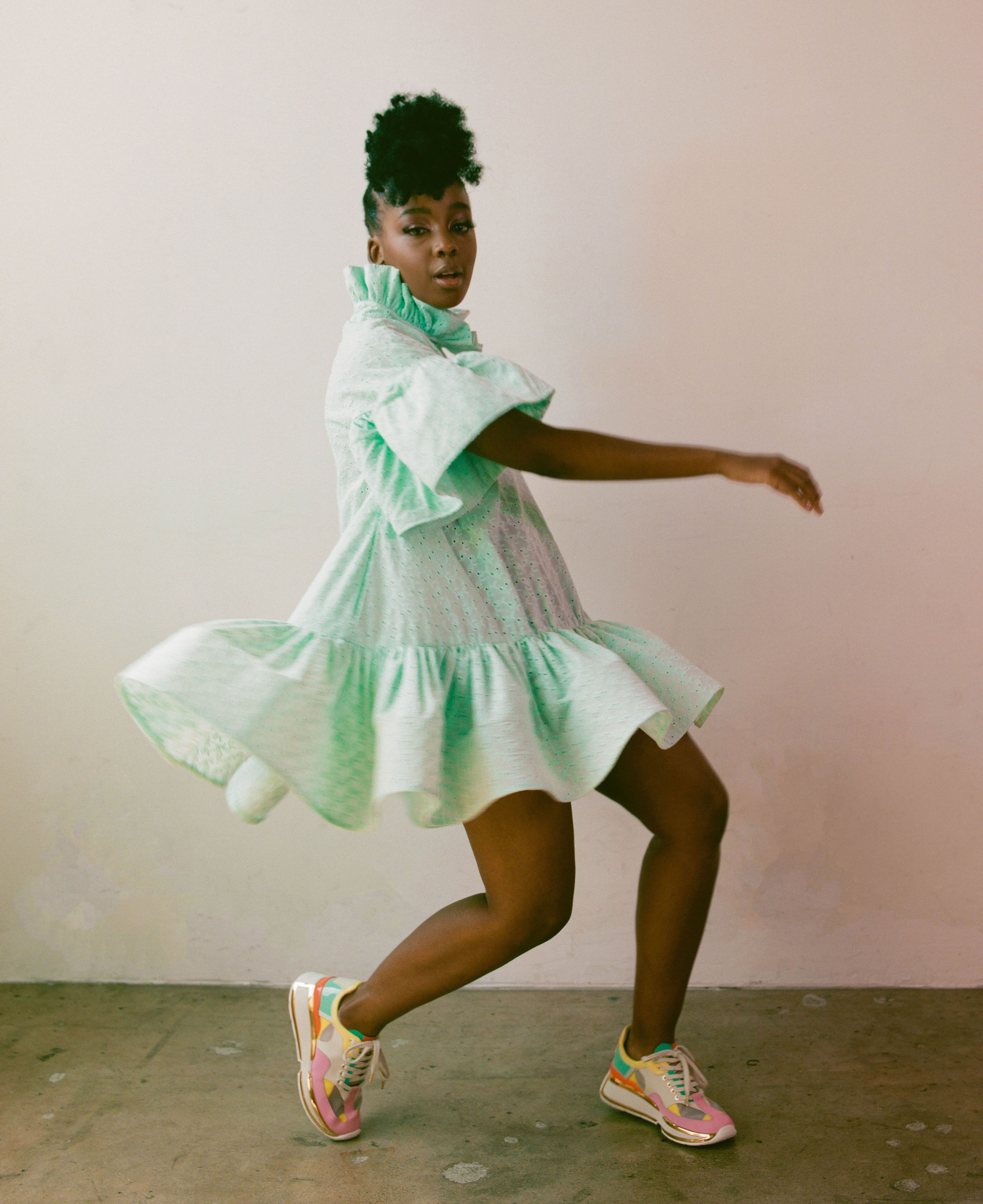
Dress by Greta Constantine. Shoes by Kat Maconie.
With its frank depiction of the many forms racial injustice can take, Underground does not shy away from social issues, but at its heart, it is anchored by Cora’s strength. Mbedu, who admits she had no knowledge of the source material when she originally auditioned, says she found her way to the character organically. “He was so intent on figuring out how I’d made the performance choices I’d made during the audition,“ she admits about her initial conversation with Jenkins. “All I had were those four scenes, but I was able to bring whatever it is that really impressed him. When I eventually read the book, I was like, ’Oh, this is why he wanted to understand where I’d drawn the character’s history from.’ Luckily the choices I’d made made complete sense to the character as a whole.“ She was struck, she says, with instant recognition of Cora’s essence, even in all her complexity. “Cora for me is fragile and broken, but still very strong—not because she’s naturally strong, but because she’s had to be strong. She’s all she has in this world,“ Mbedu elaborates. “Her freedom is tied to her running, so all she knows how to do is to run from emotional connections, from any form of connections.“
Like Cora, Mbedu has often relied on her own tenacity to get to where she is today. After wanting to be a dermatologist as a child, she found her way to acting after choosing drama as her elective in high school, which offered her the opportunity to both escape from her own experiences but also to share them, and those of others, without having to claim them as her own. “I remember at the end of tenth grade, I had written a poem that was never supposed to be performed—it was just for myself and my diary—and for some reason I thought, ’Oh, I should perform it in our final exam,’ and I did,“ she recalls. “When I performed it, at the end of it, I had grown folk crying, just weeping, and coming to me afterwards and saying, ’Thank you for speaking my heart. I didn’t know how to articulate how I’m feeling, but thank you for seeing me.’ It was in that moment where I was like, ’This drama thing is a tool for change. It is a mouthpiece for the voiceless and this is what I want to do for the rest of my life.’“
A veteran of both the critically acclaimed Is’Thunzi and the popular soap opera Generations: The Legacy, Mbedu is already a well-established actress at home, and says she made the move to the United States in 2019 always with an eventual return in mind. “It would be five years of just putting in solid work to grow myself and grow my voice so that I can one day come back to South Africa and make a positive change in our industry,“ she explains. Now with the success of The Underground Railroad, she says she is ready for whatever is to come but insists that, more than any boost the show will provide to her career, she is grateful for the personal growth the experience has offered her. “After watching all the episodes a couple of weeks ago, I actually sent Barry a text just saying, ’Thank you for allowing me to tell this story,’“ she offers, “because through playing Cora, through telling her story, and through living as her, I was able to heal wounds that I didn’t know that I had.“
The Underground Railroad is now streaming on Amazon Prime. Read this story and many more in print by ordering our inaugural issue here.
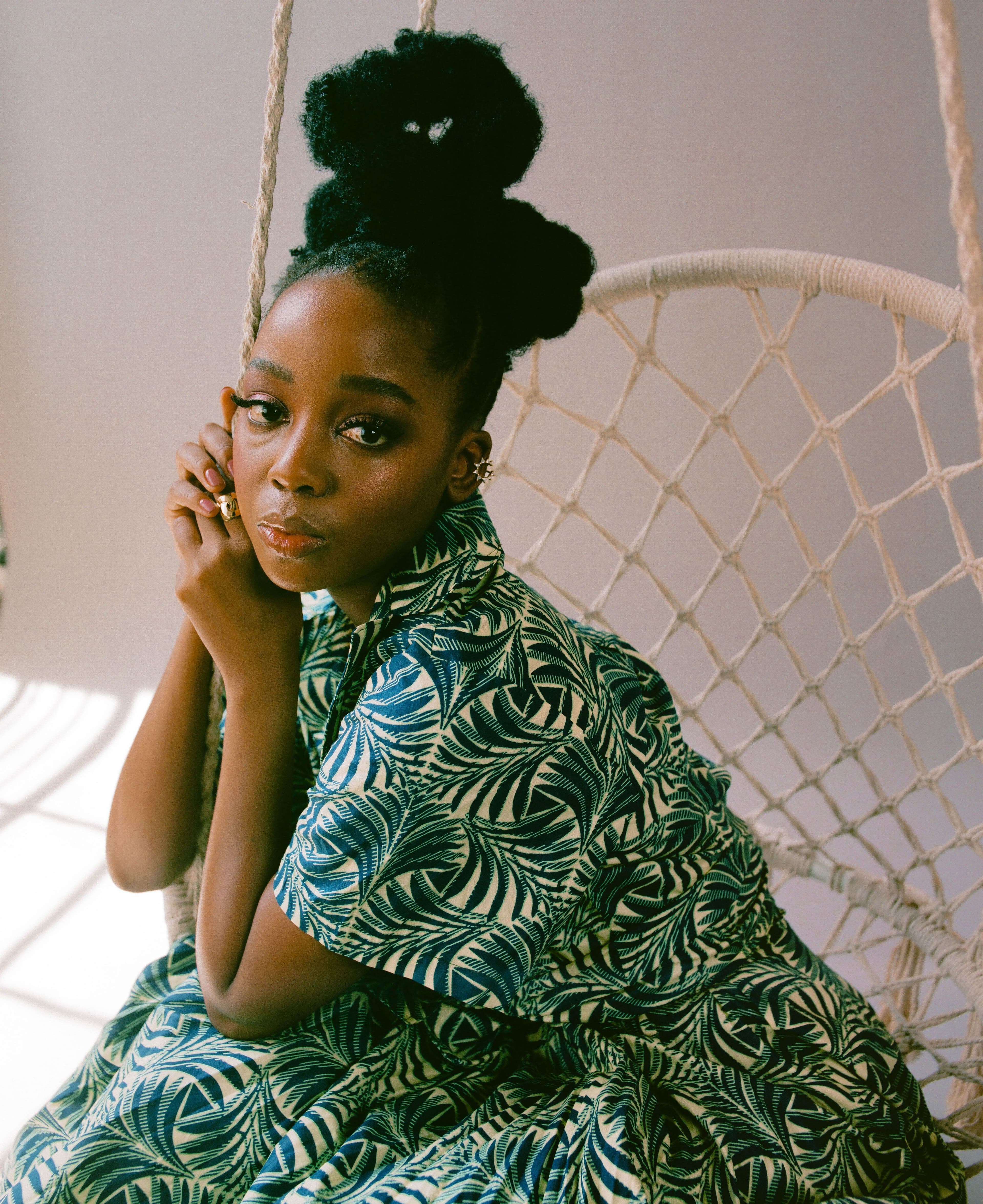
All clothing by Lavie by CK. Ear cuff by Melinda Maria. Ring by dinh van.
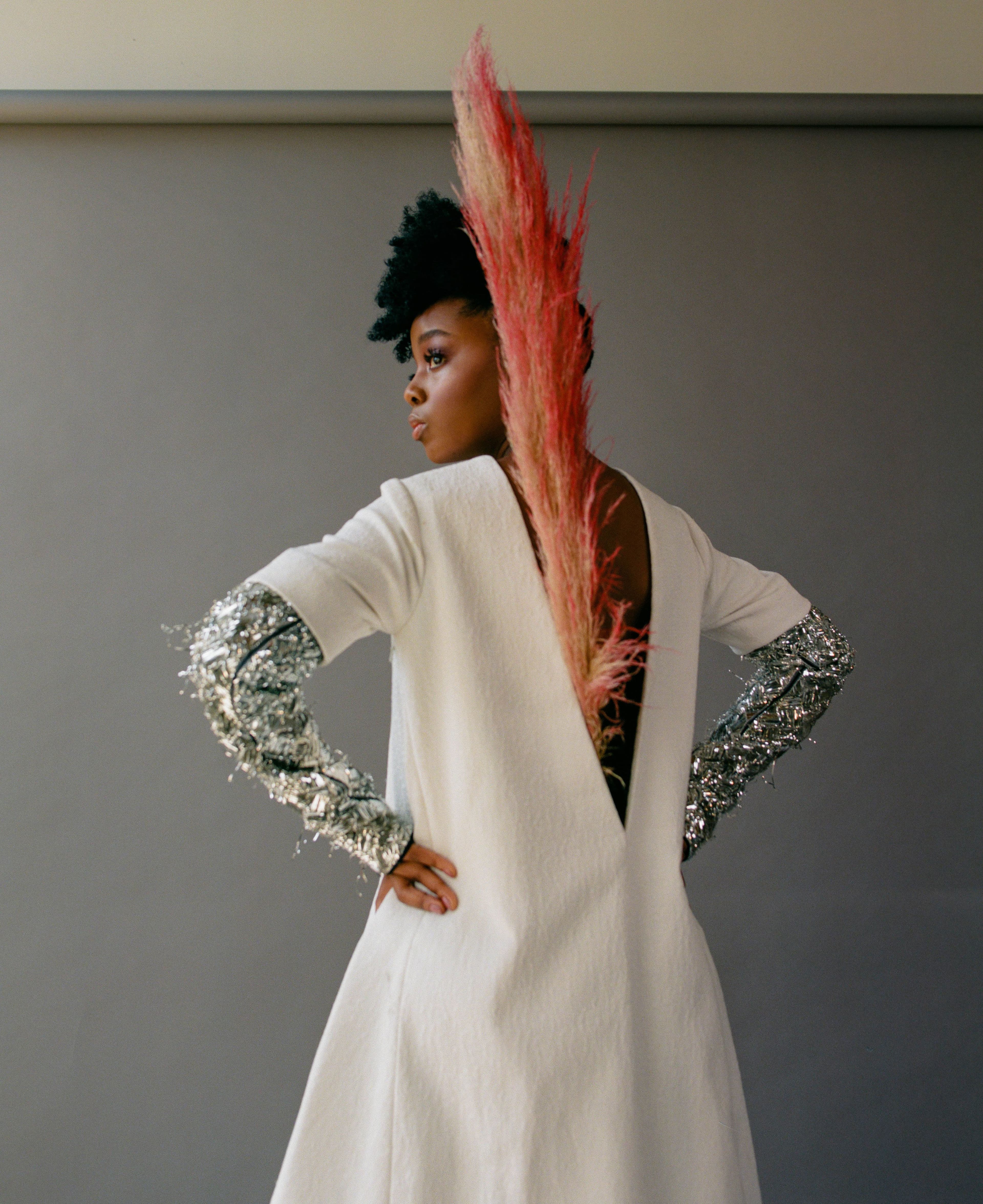
All clothing by Amna Alsalem
As a nonprofit arts and culture publication dedicated to educating, inspiring, and uplifting creatives, Cero Magazine depends on your donations to create stories like these. Please support our work here.






